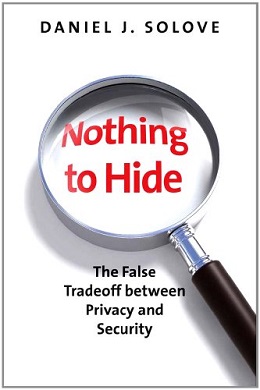Nothing to Hide (book)
Nothing to Hide |
|
|---|---|
| Author | Daniel J. Solove |
| Language | English |
| Publisher | Yale University Press |
| Publication Date | 2011 |
| ISBN | 978-0-300-16939-6 |
| Pages | 256 |
Nothing to Hide: The False Tradeoff between Privacy and Security is a book written by Daniel J. Solove, a professor of law at the George Washington University Law School. The book was published in 2011 by Yale University Press. It addresses the common argument that privacy is not important if one has "nothing to hide," and it explores the implications of surveillance and data collection on individual privacy.
Overview[edit | edit source]
The book challenges the notion that privacy is only about hiding wrongdoing. Solove argues that privacy is a fundamental right that is essential for the functioning of a democratic society. He examines the impact of government surveillance, data mining, and information technology on privacy and civil liberties.
Key Themes[edit | edit source]
Privacy vs. Security[edit | edit source]
Solove critiques the false dichotomy between privacy and security, suggesting that it is possible to have both. He discusses how privacy laws and regulations can be designed to protect individuals without compromising security.
The "Nothing to Hide" Argument[edit | edit source]
The book dissects the "nothing to hide" argument, showing that it is based on a misunderstanding of what privacy entails. Solove explains that privacy is not just about hiding information but about controlling how information is used and shared.
Impact of Surveillance[edit | edit source]
Solove explores the various ways in which surveillance affects individuals and society. He discusses the chilling effect that surveillance can have on free speech and the potential for abuse of power by authorities.
Reception[edit | edit source]
Nothing to Hide has been praised for its thorough analysis and clear writing. It has been cited in numerous academic articles and has influenced debates on privacy and surveillance.
See Also[edit | edit source]
References[edit | edit source]
External Links[edit | edit source]
Search WikiMD
Ad.Tired of being Overweight? Try W8MD's physician weight loss program.
Semaglutide (Ozempic / Wegovy and Tirzepatide (Mounjaro / Zepbound) available.
Advertise on WikiMD
|
WikiMD's Wellness Encyclopedia |
| Let Food Be Thy Medicine Medicine Thy Food - Hippocrates |
Translate this page: - East Asian
中文,
日本,
한국어,
South Asian
हिन्दी,
தமிழ்,
తెలుగు,
Urdu,
ಕನ್ನಡ,
Southeast Asian
Indonesian,
Vietnamese,
Thai,
မြန်မာဘာသာ,
বাংলা
European
español,
Deutsch,
français,
Greek,
português do Brasil,
polski,
română,
русский,
Nederlands,
norsk,
svenska,
suomi,
Italian
Middle Eastern & African
عربى,
Turkish,
Persian,
Hebrew,
Afrikaans,
isiZulu,
Kiswahili,
Other
Bulgarian,
Hungarian,
Czech,
Swedish,
മലയാളം,
मराठी,
ਪੰਜਾਬੀ,
ગુજરાતી,
Portuguese,
Ukrainian
Medical Disclaimer: WikiMD is not a substitute for professional medical advice. The information on WikiMD is provided as an information resource only, may be incorrect, outdated or misleading, and is not to be used or relied on for any diagnostic or treatment purposes. Please consult your health care provider before making any healthcare decisions or for guidance about a specific medical condition. WikiMD expressly disclaims responsibility, and shall have no liability, for any damages, loss, injury, or liability whatsoever suffered as a result of your reliance on the information contained in this site. By visiting this site you agree to the foregoing terms and conditions, which may from time to time be changed or supplemented by WikiMD. If you do not agree to the foregoing terms and conditions, you should not enter or use this site. See full disclaimer.
Credits:Most images are courtesy of Wikimedia commons, and templates Wikipedia, licensed under CC BY SA or similar.
Contributors: Prab R. Tumpati, MD

